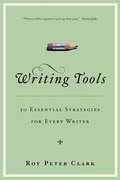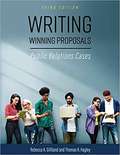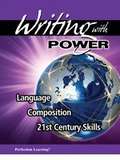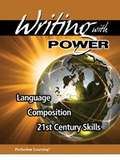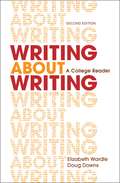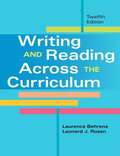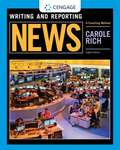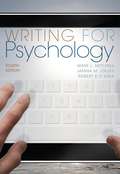- Table View
- List View
Writing Tools: 50 Essential Strategies for Every Writer
by Roy Peter ClarkWriting Tools covers everything from the most basic tool to the more complex ones and provides more than 200 examples from literature and journalism to illustrate the concepts.
Writing Unit-Lessons In Composition (3A)
by Don P. Brown Albert L. Lavin Peter Monahan Miles A. Myers James L. Pierce Mrs Louise VelteThis book presents a fundamental approach to the teaching and learning of writing.
Writing Unit-Lessons in Composition (3B)
by Don P. Brown Albert L. Lavin Peter Monahan Miles A. Myers James L. Pierce Mrs Louise VelteThis book presents a fundamental approach to the teaching and learning of writing.
Writing Winning Proposals: Public Relations Cases
by Thomas Hagley Rebecca DeemerWriting Winning Proposals: Public Relations Cases teaches students, as well as practitioners, how to conceptualize and write public relations plans and proposals from the perspective of the plan reviewer — typically non-public relations practitioners. <P><P> The process illustrated within the book is designed to win approval from the plan reviewers and to foster a path for award-winning plan writing. The book thoroughly describes components of the plan, and then provides many actual cases to further demonstrate the strategy and thought process behind plan construction. The cases have multiple suggested writing assignments, role plays, and case problems. These help students and practitioners explore progression of plan construction in various avenues where public relations may be required and practiced. Cases highlighting community relations and engagement, media relations, employee relations and empowerment, government relations, crisis management and prevention, risk communication, corporate communication, social media implementation, arts and entertainment, corporate communication, social responsibility, promotional endeavors, and event planning are all included. <P><P> Writing Winning Proposals is ideal for introductory public relations courses, as well as courses in public relations writing, plans, and campaigns. It can also be used as an academic text supplement, a campaigns workbook, or for strategic planning. <P><P> Rebecca A. Gilliland is a distinguished professor of service learning and an associate professor of communication at the University of Indianapolis. A Fulbright Scholar and a Plank Fellow, Professor Gilliland has traveled the United States and around the world in an effort to stay current in the public relations industry while studying her areas of interest. She advises a nationally award-winning student run public relations firm and has taught numerous public relations classes. She has worked abroad and domestically, in sports promotions, corporate public relations, and in the non-profit sector. She is accredited in public relations and earned a doctorate in education with cognates in both public relations and communication studies. <P><P> Thomas R. Hagley is a senior instructor of public relations retired from the University of Oregon’s School of Journalism and Communication. A recipient of the school’s Jonathan Marshall Award for innovative teaching, he has taught more than 50 classes in public relations principles, advanced writing, strategic planning, and campaigns to a total enrollment of more than 1,000 students. His work as an educator was preceded by 30 years of professional experience as an executive with Alumax, Inc., Hill and Knowlton, Inc., his own consulting business, Alcoa, as publications chief for Newport News Shipbuilding and Dry Dock Co., and general assignment/investigative reporter for The Cleveland Plain Dealer.
Writing With Power, Grade 7
by PLC Editors StaffWriting With Power has chapters that will answer students questions and lay the foundation for the writing instruction and activities presented in future chapters.
Writing With Power, Grade 9
by Peter Smagorinsky Joyce Senn Constance WeaverLanguage Arts Textbook Grade 9
Writing Without Formulas
by William H. ThelinWriting Without Formulas shows students how to write instead of telling them. The first part focuses students on purposes for writing, critical analysis, audience awareness, organization of ideas, and language usage. In Part II, students learn about brainstorming and other activities associated with the writing process, investigate the best strategies for effective reading, see practical approaches to collaboration, and develop strategies for finding and using outside resources.
Writing Words in the Sky (Fountas & Pinnell Classroom, Guided Reading Grade 4)
by Katrina NelsonWriting "Happy Birthday" may not sound like a big deal … unless you're a skywriter. Skywriters must often dive and loop as they fly, creating surprising messages for us in smoke, way up in the sky. NIMAC-sourced textbook
Writing Workshop, Level A
by Beverly Ann Chin Phyllis Goldenberg Frederick J. PanzerA publisher-supplied textbook
Writing Workshop, Level B
by Beverly Ann Chin Phyllis Goldenberg Frederick J. PanzerA publisher-supplied textbook
Writing Workshop, Level C
by Beverly Ann Chin Phyllis Goldenberg Frederick J. PanzerA publisher-supplied textbook
Writing Workshop, Level D
by Beverly Ann Chin Phyllis Goldenberg Frederick J. PanzerA publisher-supplied textbook
Writing Workshop, Level E
by Beverly Ann Chin Phyllis Goldenberg Frederick J. PanzerA publisher-supplied textbook
Writing Workshop, Level F
by Beverly Ann Chin Phyllis Goldenberg Frederick J. PanzerA publisher-supplied textbook
Writing a Research Paper: A Step-By-Step Approach
by Phyllis Goldenberg Linda Anderson Rose DepotoA publisher-supplied textbook
Writing about Literature through Theory
by John Pennington Ryan CordellWriting about Literature through Theory by Pennington and Cordell is the first introduction to literature text to embrace both the best of print culture and the opportunities of the digital age, while being grounded in the rhetoric and composition field pertaining to the developmental writing process. It is also unique because it uses literary theory as the foundation for students’ development as critical thinkers and writers. Following Gerald Graff’s ideas in “Disliking Books at an Early Age,” Writing about Literature through Theory uses theoretical approaches to open literary texts up to students across the disciplines. Writing about Literature through Theory focuses on writing as a process, and each chapter includes the following:
Writing about Writing: A College Reader 2nd Edition
by Elizabeth Wardle Doug DownsLiteracies : where do your ideas about reading and writing come from? -- Individual in community : how do texts mediate activities? -- Rhetoric : how is meaning constructed in context? -- Processes : how are texts composed? -- Multimodal composition : what counts as writing?
Writing and Grammar 2010: Grammar Handbook
by Prentice-Hall StaffThis handy reference for writing, grammar, usage and mechanics focuses on meaningful grammar applications with grade-specific, real-world examples and lots of exercises for grammar practice.
Writing and Grammar 7 (3rd Edition)
by June W. Cates Elizabeth Rose Kimberly Y. Stegall Dawn L. WatkinsWriting and grammar for Christian schools.
Writing and Grammar 8 (Third Edition): Student Worktext
by June W. Cates Elizabeth Rose Kimberly Y. Stegall Dawn L. WatkinsA practice oriented guide for grammar and sentences, with focus on writing activities. Some of the writing projects include photo essays, news report, character profile etc.
Writing and Grammar: Communication in Action (Diamond Level, Texas Edition)
by Prentice HallIn reading, the objectives include word meaning: main idea: supporting details: summarization: relationships and outcomes; inferences and generalizations: point, of view: propaganda; fact and nonfact. In writing, your objectives are to write a composition to a specific purpose and audience, with ideas that develop, support, and elaborate the central idea and recognize sentence construction, English usage, and the use of spelling, capitalization, and punctuation within the context of a written passage.
Writing and Grammar: Communication in Action Handbook (Platinum)
by Prentice HallWriting And Grammar Handbook: Part 1 Writing Part 2 Grammar, Usage, and Mechanics Part 3 Academic and Workplace Skills
Writing and Reading Across the Curriculum (Twelfth Edition)
by Laurence Behrens Leonard J. RosenRemaining one of the best-selling interdisciplinary composition texts for over twenty-five years, Writing and Reading Across the Curriculum helps readers learn to write effectively for college.
Writing and Reporting News: A Coaching Method
by Carole RichPulling examples straight from recent headlines, WRITING AND REPORTING NEWS: A COACHING METHOD, 8e uses tips and techniques from revered writing coaches and award-winning journalists to help you develop the writing and reporting skills you need to succeed in the changing world of journalism. Full-color photographs and a strong storytelling approach keep you captivated throughout the book. <P><P>An entire chapter is devoted to media ethics, while ethical dilemmas in each chapter give you practice working through ethical issues before you face them on the job. Offering the most up-to-date coverage available, the Eighth Edition fully integrates multimedia content into the chapters-reflecting the way the news world actually operates. It also includes an all-new book glossary featuring many of the newer terms used in Journalism. Integrating new trends in the convergence of print, broadcast, and online media, WRITING AND REPORTING NEWS equips you with the fundamental skills you need for media careers now-and in the future.
Writing for Psychology
by Janina M. Jolley Mark L. Mitchell Robert P. O'SheaWRITING FOR PSYCHOLOGY, Fourth Edition offers concise assistance for students writing their research analyses using APA style. By providing concrete examples of common errors, the authors show rather than merely tell students what to do and what to avoid. This manual will help students adhere to the basics of APA style; refine critical thinking skills, library search skills, revising skills, editing skills, and proofing skills; and avoid plagiarism. Checklists precede a summary at the end of every chapter, giving students the chance to make sure they have been thorough in their reports.
